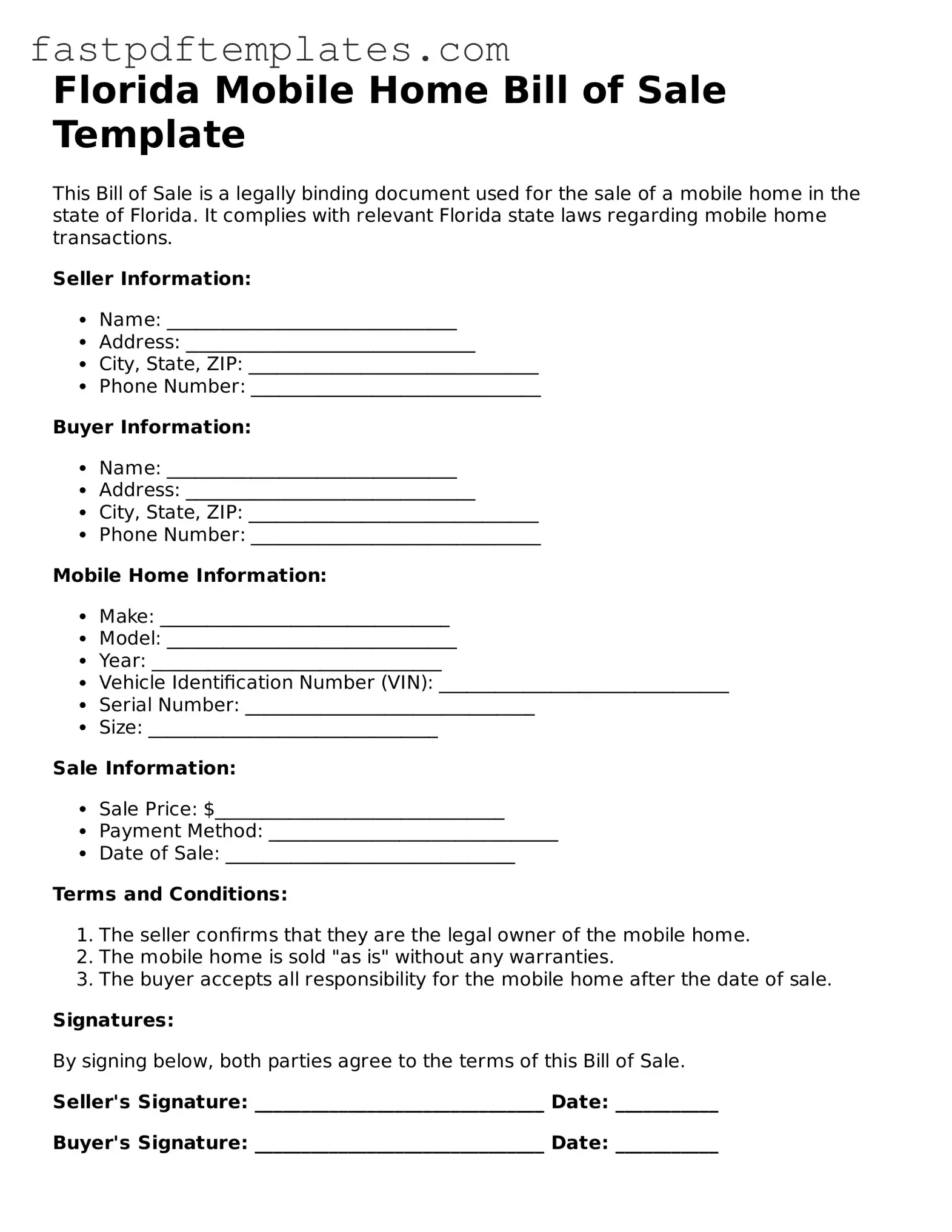The Florida Vehicle Bill of Sale serves a similar purpose as the Mobile Home Bill of Sale. Both documents facilitate the transfer of ownership from one party to another. Just as the Mobile Home Bill of Sale outlines details like the buyer, seller, and description of the mobile home, the Vehicle Bill of Sale includes information about the vehicle, such as the make, model, year, and Vehicle Identification Number (VIN). Both forms serve as legal proof of the transaction, ensuring that the buyer has the right to register the property in their name.
The Boat Bill of Sale is another document that shares similarities with the Mobile Home Bill of Sale. Both forms are used to transfer ownership of personal property. In the case of the Boat Bill of Sale, it includes essential details like the boat’s hull identification number, make, model, and year. Just like the mobile home transaction, this document protects both parties by providing a clear record of the sale and the terms agreed upon.
The RV Bill of Sale is comparable to the Mobile Home Bill of Sale, as both pertain to the sale of recreational vehicles. Each document requires information about the seller and buyer, as well as a description of the vehicle being sold. The RV Bill of Sale also serves as proof of ownership transfer, allowing the new owner to register the RV with the appropriate authorities, similar to how the mobile home is registered.
The Trailer Bill of Sale is akin to the Mobile Home Bill of Sale in that it facilitates the transfer of ownership for trailers. This document includes details such as the trailer’s VIN, make, model, and year. Both forms protect the interests of the buyer and seller by providing a legal record of the transaction, which is crucial for registration and insurance purposes.
The Lease Agreement can be seen as a related document, especially when mobile homes are rented. While the Mobile Home Bill of Sale focuses on ownership transfer, a Lease Agreement outlines the terms under which a mobile home is rented. Both documents are essential for defining the rights and responsibilities of the parties involved, ensuring clarity in the arrangement.
The Property Deed is another document that bears similarities to the Mobile Home Bill of Sale. While a Property Deed typically applies to real estate, both documents signify ownership. The Property Deed contains information about the property’s location, legal description, and the parties involved in the transaction, similar to how the Mobile Home Bill of Sale details the specifics of the mobile home being sold.
The Warranty Deed also shares a connection with the Mobile Home Bill of Sale. This document guarantees that the seller has the legal right to sell the property and that the property is free of liens or encumbrances. Like the Mobile Home Bill of Sale, it serves to protect the buyer by ensuring a clear title to the property being transferred.
The Affidavit of Title is similar in purpose to the Mobile Home Bill of Sale, as it provides a sworn statement regarding the ownership of the mobile home. This document can be used to affirm the seller's right to sell the property and to clarify any potential disputes about ownership. Both documents are vital in ensuring that the transfer of ownership is legitimate and recognized by authorities.
The Gift Deed can also be compared to the Mobile Home Bill of Sale. While the latter involves a sale, a Gift Deed is used when ownership is transferred without any monetary exchange. Both documents require details about the property and the parties involved, ensuring that the transfer is legally recognized. Each serves to protect the interests of both parties, even in a non-commercial transaction.
Finally, the Affidavit of Heirship is relevant when a mobile home is inherited. This document establishes the legal heirs of a deceased individual and their right to the property. While the Mobile Home Bill of Sale focuses on sales transactions, both documents ensure that ownership is properly transferred and recognized, safeguarding the rights of the new owner.

